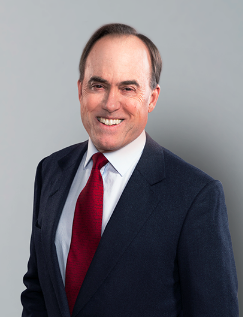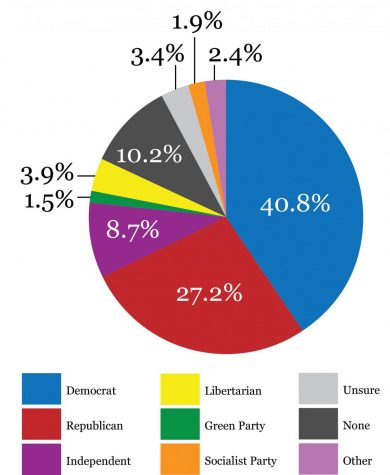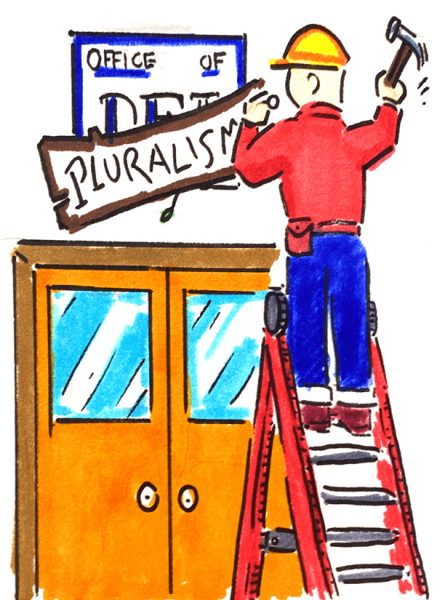Inside Local Politics: An Interview with Thad Gray, State Treasurer Candidate

On Tuesday, November 6, voters in Connecticut will have the opportunity to elect a new State Treasurer for the first time in 20 years. The current State Treasurer, Democrat Denise Nappier, will not to seek re-election after serving five terms in office. The candidate for the Republican Party, Mr. Thad Gray, is a former investment officer, resident of Lakeville, and parent of Eleanor Gray ’19. Mr. Gray is running against Democratic candidate Shawn Wooden and Libertarian candidate Jesse Brohinsky.
The role of the State Treasurer is to oversee and manage state investments, debts, and savings. The following interview with Mr. Gray discusses his campaign for Treasurer, his qualifications, and his ideas and objectives for policy reforms in Connecticut.
Why did you decide to run for State Treasurer? What made you want to leave your career as an investment banker in order to run for political office?
I am running for Treasurer as a call to service on behalf of the state I grew up in and love. Wherever I go across our state, I hear the same five words from voters: if we don’t fix Connecticut’s problems, “we are out of here.” I don’t believe there is a single solution or magic bullet for Connecticut’s problems, nor is there a single individual who can fix our problems. We need to do it as part of a team, and my 35 years of directly relevant financial experience makes me the right person to be on a new team as State Treasurer.
What experiences do you have that you feel make you a strong candidate?
I spent 35 years in the financial services sector managing pension fund assets and debt issuance. These are areas of expertise that are directly relevant to the job of state treasurer. The state treasurer must select and hire money managers for the state pension funds. This is something I have done for almost three decades in a professional capacity on behalf of public pension funds, with billions of dollars at stake.
What main goals do you hope to achieve if you are elected?
My three major objectives are 1) improving the [performance] of our pension assets, which protect the retirement security of 220,000 teachers and other public employees; 2) stopping the downward slide of our state’s credit rating, which is the third worst in the United States; and 3) acting as the “fiscal conscience” of the state while serving on over 20 different boards and commissions. It is important to remember that all financial transactions the state undertakes are interrelated. Investment returns for the pension funds and borrowing decisions impact the state’s credit rating, which taxpayers pay for with higher interest rates when the credit rating deteriorates.
What do you think are the main issues that need to be addressed in Connecticut? Which types of reforms and plans do you plan on enforcing to address them?
The major financial issue our state faces is a $50 billion unfunded pension liability gap. This means that politicians have made promises to pensioners that they haven’t put enough money aside to pay for. For instance, if your parents set up a fund to pay for your college education but only put in 30% of the cost of your tuition over four years, there would be a similar financial gap and you would be out of luck when you got to college. Pensioners in CT face the same problem. There isn’t enough money in our pension system to pay for the retirement they were promised. While the Treasurer isn’t a legislator and doesn’t write laws, the Treasurer should be a vocal advocate for pension reform to make sure that our pension system is brought back into balance.
How will you manage and invest the state’s pension funds? Your website states that you will “protect the public interest by making sound investment decisions with no political or social agenda.” What will this look like, and what do you feel is the most important use of these funds?
I will do a top-to-bottom review of all investment managers who are handling our state pension assets and will take a fresh look at all policies, procedures, and planning in the Treasurer’s office. Investment managers who have not met the expectations that were set for them when they were hired or have underperformed versus the benchmarks in the marketplace will be changed without exception, and better-performing managers will be brought in to replace them. While I support “socially responsible investing” when it can be achieved without compromising investment returns, I will put an emphasis on the highest possible returns with acceptable risk, and will not play politics with the pensioners’ and taxpayers’ money.
What would you like to say to young Americans who are just now getting to vote for the first time? Why is their participation and voice in government important?
It is very, very important to the success of any democracy that young people go out and vote. If you believe in democracy, you have a moral obligation to vote. What I tell people is, “vote your hearts because we love this state; vote your pocketbooks because we want this state to be affordable to live in.” More and more young people are disgusted with our political party process, which I completely understand. However, anyone who isn’t affiliated with a political party can vote for me on the Independent Party line. I hope to have the support of the Hotchkiss community on Tuesday, November 6th!





